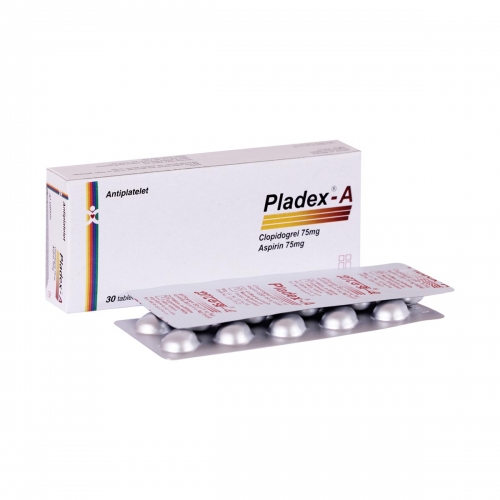ঔষধের বিস্তারিত বা বিকল্প ঔষধ জানতে ঔষধের নাম দিয়ে সার্চ দিন। যেমন- Napa বা Alatrol বা Amodis
Pladex-A 75mg+75mg
TabletClopidogrel + Aspirin
Unimed Unihealth MFG. Ltd
Other Strength:
Alternative:
- Odrel Plus 75mg+75mg
- ECOSPRIN PLUS 75mg+75mg
- Lopirel Plus 75mg+75mg
- Anclog Plus 75mg+75mg
- Replet® Plus 75mg+75mg
- Preclot AS 75mg+75mg
- Clopidol Plus 75mg+75mg
- Clocard-A 75mg+75mg
- Dogrel Plus 75mg+75mg
- Plagrin Plus 75mg+75mg

Pladex-A
Presentation
Pladex-A tablet: Light brown, parallel capsule shaped, scored, having engraved on other side, film coated tablet; each tablet contains Clopidogrel Bisulfate equivalent to Clopidogrel INN 75 mg & Aspirin USP 75 mg as coated granules.
Indication
Pladex-A is indicated for the prevention of atherosclerotic events in patients with history of symptomatic atherosclerotic disease (ischemic stroke, myocardial infarction, peripheral arterial disease.) Antiplatelet drugs decrease platelet aggregation and may inhibit thrombus formation in the arterial circulation, while anti-coagulants have little effect. It is also used for its antiplatelet activity in the initial treatment of cardiovascular disorders such as myocardial infarction and for the prevention of cardiovascular events in a variety of conditions or procedures for patients at risk.
Dosage & administration
Orally it is only recommended for adult. The recommended dose is one Pladex-A tablet once daily.
Contra-indications, warnings, etc.
Contra-indications: Hypersensitivity to Clopidogrel & Aspirin. Hypo-prothrombinaemia, haemophilia and active peptic ulceration, active pathological bleeding such as peptic ulcer or intracranial haemorrhage.
Warnings: It should not be given to children, particularly those under 12 years, unless the expected benefits outweight the possible risks. Aspirin may be a contributory factor in the causation of Reye’s syndrome in some children. Salicylates should be used with caution in patients with a history of peptic ulceration or coagulation abnormalities. They may also induce gastro-intestinal haemorrhage occasionally major. Aspirin should be used with caution in patients with impaired renal function, hepatic function (avoid if severe) or in patients who are dehydrated. In large doses, it may also decrease insulin requirements.
Precautions: Clopidogrel should be avoided for the first few days after myocardial infarction and for seven days after ischemic disease. Clopidogrel is not recommended in unstable angina, coronary artery bypass grafting and percuteneous transluminal coronary angioplasty. Clopidogrel is not recommended in patients at risk of increased bleeding from trauma, surgery or other pathological conditions. Clopidogrel should be discontinued seven days before surgery if antiplatelet effect is not desirable. GI bleeding: Clopidogrel prolongs the bleeding time. Clopidogrel should be used with caution in patients who have lesions with a propensity to bleed (such as ulcers). Drugs that might induce such lesions such as non-steroidal anti-inflammatory drugs (NSAIDs) should be used with caution in patients taking Clopidogrel. Use in hepatically impaired patients: Experience in limited in patients with severe hepatic disease, who may have bleeding diatheses. Clopidogrel should be used with caution in this population.
Use in pregnancy and lactation: Pregnancy: There are, however, no adequate and wellcontrolled studies in pregnant women. It should be avoided during last 3 months of pregnancy and should be used during pregnancy only if clearly needed. Lactation: As Aspirin is excreted in breast milk, it should not be taken by patients who are breastfeeding.
Drug interactions: Salicylates may enhance the effect of anticoagulants, oral hypoglycaemic agents, phenytoin and sodium valporate. They inhibit the uricosuric effect of probenecid and may increase the toxicity of sulphonomides. They may also precipitate bronchospasm or induce attacks of asthma in susceptible subjects. Non-Steroidal Anti Inflammatory Drugs (NSAIDs): In healthy volunteers receiving naproxen, concomitant administration of Clopidogrel was associated with increased occult gastro intestinal blood loss. NSAIDs and Clopidogrel should be co-administered with caution. Warfarin: Thesafety of the co-administration of Clopidogrel with warfarin has not been established. Consequently, concomitant administration of these two agents should be undertaken with caution.
Side effects: Salicylates may induce hypersensitivity, asthma, urate kidney stones, chronic gastro-intestinal blood loss, tinnitus, nausea and vomiting. The clinically important adverse reactions of Clopidogrel are as follows – Gastrointestinal haemorrhage, agranulocytosis dyspepsia, gastritis, constipation, diarrhoea, rash, palpitation, vomiting, paresthesia, neuralgia, gout, arthritis, clotting disorder, anaemia, anxiety, insomnia, cataract, conjunctivitis, leukopenia, granulocytopenia, urticaria.
Pharmaceutical precaution
Store in a cool and dry place, protected from light.
Packaging quantities
Pladex-A tablet: Cartons containing 30 tablets in blister.
Paediatric use : Safety and effectiveness in the paediatric population have not been established.
এই পাতাটি ২৩২ বার দেখা হয়েছে
রাজডক কী?
ফ্রী সদস্য হোন Click Here
ডাক্তার হিসাবে যোগদান করতে Click Here
নার্স / টেকনোলজিস্ট হিসাবে যোগদান করতে Click Here
ফ্রী সদস্য হোন Click Here
ডাক্তার হিসাবে যোগদান করতে Click Here
নার্স / টেকনোলজিস্ট হিসাবে যোগদান করতে Click Here

